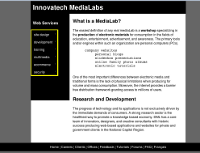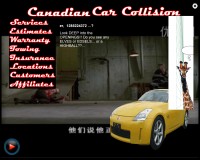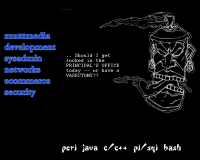 Jacek, a Polish schoolboy, is told by his teacher that he has
been chosen to carry the Polish flag in the May Day parade.
"Why me?" whines the boy. "Three years ago I carried the flag
when Brezhnev was the Secretary; then I carried the flag when it was
Andropov's turn, and again when Chernenko was in the Kremlin. Why is
it always me, teacher?"
"Because, Jacek, you have such golden hands," the teacher
explains.
-- being told in Poland, 1987
Jacek, a Polish schoolboy, is told by his teacher that he has
been chosen to carry the Polish flag in the May Day parade.
"Why me?" whines the boy. "Three years ago I carried the flag
when Brezhnev was the Secretary; then I carried the flag when it was
Andropov's turn, and again when Chernenko was in the Kremlin. Why is
it always me, teacher?"
"Because, Jacek, you have such golden hands," the teacher
explains.
-- being told in Poland, 1987
 Ever wondered about the origins of the term "bugs" as applied to computer
technology? U.S. Navy Capt. Grace Murray Hopper has firsthand explanation.
The 74-year-old captain, who is still on active duty, was a pioneer in
computer technology during World War II. At the C.W. Post Center of Long
Island University, Hopper told a group of Long Island public school adminis-
trators that the first computer "bug" was a real bug--a moth. At Harvard
one August night in 1945, Hopper and her associates were working on the
"granddaddy" of modern computers, the Mark I. "Things were going badly;
there was something wrong in one of the circuits of the long glass-enclosed
computer," she said. "Finally, someone located the trouble spot and, using
ordinary tweezers, removed the problem, a two-inch moth. From then on, when
anything went wrong with a computer, we said it had bugs in it." Hopper
said that when the veracity of her story was questioned recently, "I referred
them to my 1945 log book, now in the collection of the Naval Surface Weapons
Center, and they found the remains of that moth taped to the page in
question."
[actually, the term "bug" had even earlier usage in
regard to problems with radio hardware. Ed.]
Ever wondered about the origins of the term "bugs" as applied to computer
technology? U.S. Navy Capt. Grace Murray Hopper has firsthand explanation.
The 74-year-old captain, who is still on active duty, was a pioneer in
computer technology during World War II. At the C.W. Post Center of Long
Island University, Hopper told a group of Long Island public school adminis-
trators that the first computer "bug" was a real bug--a moth. At Harvard
one August night in 1945, Hopper and her associates were working on the
"granddaddy" of modern computers, the Mark I. "Things were going badly;
there was something wrong in one of the circuits of the long glass-enclosed
computer," she said. "Finally, someone located the trouble spot and, using
ordinary tweezers, removed the problem, a two-inch moth. From then on, when
anything went wrong with a computer, we said it had bugs in it." Hopper
said that when the veracity of her story was questioned recently, "I referred
them to my 1945 log book, now in the collection of the Naval Surface Weapons
Center, and they found the remains of that moth taped to the page in
question."
[actually, the term "bug" had even earlier usage in
regard to problems with radio hardware. Ed.]
 This thing all things devours:
Birds, beasts, trees, flowers;
Gnaws iron, bites steel;
Grinds hard stones to meal;
Slays king, ruins town,
And beats high mountain down.
This thing all things devours:
Birds, beasts, trees, flowers;
Gnaws iron, bites steel;
Grinds hard stones to meal;
Slays king, ruins town,
And beats high mountain down.
 A lot of the stuff I do is so minimal, and it's designed to be minimal.
The smallness of it is what's attractive. It's weird, 'cause it's so
intellectually lame. It's hard to see me doing that for the rest of
my life. But at the same time, it's what I do best.
-- Chris Elliot, writer and performer on "Late Night with David Letterman"
A lot of the stuff I do is so minimal, and it's designed to be minimal.
The smallness of it is what's attractive. It's weird, 'cause it's so
intellectually lame. It's hard to see me doing that for the rest of
my life. But at the same time, it's what I do best.
-- Chris Elliot, writer and performer on "Late Night with David Letterman"
 Scotty: Captain, we din' can reference it!
Kirk: Analysis, Mr. Spock?
Spock: Captain, it doesn't appear in the symbol table.
Kirk: Then it's of external origin?
Spock: Affirmative.
Kirk: Mr. Sulu, go to pass two.
Sulu: Aye aye, sir, going to pass two.
Scotty: Captain, we din' can reference it!
Kirk: Analysis, Mr. Spock?
Spock: Captain, it doesn't appear in the symbol table.
Kirk: Then it's of external origin?
Spock: Affirmative.
Kirk: Mr. Sulu, go to pass two.
Sulu: Aye aye, sir, going to pass two.

 Sin lies only in hurting other people unnecessarily. All other "sins" are
invented nonsense. (Hurting yourself is not sinful -- just stupid).
-- Lazarus Long
Sin lies only in hurting other people unnecessarily. All other "sins" are
invented nonsense. (Hurting yourself is not sinful -- just stupid).
-- Lazarus Long
 For those of you who have been unfortunate enough to never have tasted the
'Great Chieftain O' the Pudden Race' (i.e. haggis) here is an easy to follow
recipe which results in a dish remarkably similar to the above mentioned
protected species.
Ingredients:
1 Sheep's Pluck (heart, lungs, liver) and bag
2 teacupsful toasted oatmeal
1 teaspoonful salt
8 oz. shredded suet
2 small onions
1/2 teaspoonful black pepper
Scrape and clean bag in cold, then warm, water. Soak in salt water
overnight. Wash pluck, then boil for 2 hours with windpipe draining over
the side of pot. Retain 1 pint of stock. Cut off windpipe, remove surplus
gristle, chop or mince heart and lungs, and grate best part of liver (about
half only). Parboil and chop onions, mix all together with oatmeal, suet,
salt, pepper and stock to moisten. Pack the mixture into bag, allowing for
swelling. Boil for three hours, pricking regularly all over. If bag not
available, steam in greased basin covered by greaseproof paper and cloth for
four to five hours.
For those of you who have been unfortunate enough to never have tasted the
'Great Chieftain O' the Pudden Race' (i.e. haggis) here is an easy to follow
recipe which results in a dish remarkably similar to the above mentioned
protected species.
Ingredients:
1 Sheep's Pluck (heart, lungs, liver) and bag
2 teacupsful toasted oatmeal
1 teaspoonful salt
8 oz. shredded suet
2 small onions
1/2 teaspoonful black pepper
Scrape and clean bag in cold, then warm, water. Soak in salt water
overnight. Wash pluck, then boil for 2 hours with windpipe draining over
the side of pot. Retain 1 pint of stock. Cut off windpipe, remove surplus
gristle, chop or mince heart and lungs, and grate best part of liver (about
half only). Parboil and chop onions, mix all together with oatmeal, suet,
salt, pepper and stock to moisten. Pack the mixture into bag, allowing for
swelling. Boil for three hours, pricking regularly all over. If bag not
available, steam in greased basin covered by greaseproof paper and cloth for
four to five hours.
 * Overfiend sighs
* Overfiend sighs
 "Richard, in being so fierce toward my vampire, you were doing
what you wanted to do, even though you thought it was going to hurt
somebody else. He even told you he'd be hurt if..."
"He was going to suck my blood!"
"Which is what we do to anyone when we tell them we'll be hurt
if they don't live our way."
...
"The thing that puzzles you," he said, "is an accepted saying that
happens to be impossible. The phrase is hurt somebody else. We choose,
ourselves, to be hurt or not to be hurt, no matter what. Us who decides.
Nobody else. My vampire told you he'd be hurt if you didn't let him? That's
his decision to be hurt, that's his choice. What you do about it is your
decision, your choice: give him blood; ignore him; tie him up; drive a stake
through his heart. If he doesn't want the holly stake, he's free to resist,
in whatever way he wants. It goes on and on, choices, choices."
"When you look at it that way..."
"Listen," he said, "it's important. We are all. Free. To do.
Whatever. We want. To do."
-- Richard Bach, "Illusions"
"Richard, in being so fierce toward my vampire, you were doing
what you wanted to do, even though you thought it was going to hurt
somebody else. He even told you he'd be hurt if..."
"He was going to suck my blood!"
"Which is what we do to anyone when we tell them we'll be hurt
if they don't live our way."
...
"The thing that puzzles you," he said, "is an accepted saying that
happens to be impossible. The phrase is hurt somebody else. We choose,
ourselves, to be hurt or not to be hurt, no matter what. Us who decides.
Nobody else. My vampire told you he'd be hurt if you didn't let him? That's
his decision to be hurt, that's his choice. What you do about it is your
decision, your choice: give him blood; ignore him; tie him up; drive a stake
through his heart. If he doesn't want the holly stake, he's free to resist,
in whatever way he wants. It goes on and on, choices, choices."
"When you look at it that way..."
"Listen," he said, "it's important. We are all. Free. To do.
Whatever. We want. To do."
-- Richard Bach, "Illusions"